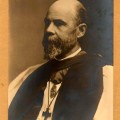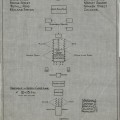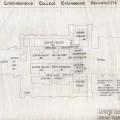The First College Sunday and the First Student Rag: 1920
14 April 2015
- Dean Ryle, Westminster 1920
- Rag procession chart for the visit of the Minister of Labour Dr Macnamara in 1920
- College Sunday seating plan
With the end of the First World War and – in 1919 – the introduction of Loughborough College’s new diploma courses, Principal Herbert Schofield was determined that the College should develop along the lines of a university. One sign of this was the decision to allow students to wear undergraduate gowns at lectures. Another was the introduction of an annual service at the parish church with a sermon by a distinguished visiting preacher.
This was known as ‘College Sunday’ when staff and students in academic dress, preceded by the newly acquired College Mace, left the College in Greenclose Lane and were joined by the Mayor and Corporation to walk in procession to and from the parish church. The first College Sunday was held on 7th November 1920 when, according to the Loughborough Monitor, 400-500 students assembled. College Sunday subsequently took place on the third Sunday morning in October each year to mark the start of the College year.
Schofield succeeded in getting many eminent clerics to preach at the annual College Sunday service. The very first speaker was the Dean of Westminster, the Right Reverend HE Ryle. Only a few months earlier, in August 1920, Dean Ryle had received a suggestion from an army chaplain that an unknown British soldier from the battlefields of France should be buried in Westminster Abbey to represent the thousands of Empire dead.
Thanks to Dean Ryle the proposal was adopted. Indeed, on the evening of the 7th November 1920, the very day that the Dean had preached at Loughborough’s first ever College Sunday service, the body of the Unknown Soldier was brought home from France. He was buried in Westminster Abbey a few days later on Remembrance Day, 11th November 1920. The famous inscription on the stone commemorating him was written by Dean Ryle himself.
After his College Sunday sermon at Loughborough the Dean requested a day’s holiday for the students, which Principal Schofield agreed to. Dean Ryle also addressed the College in the Congregational Chapel the following day. Significantly, his lecture was on ‘The Making of a University’. Accompanied by a great crowd of students and the Cadet Corps Band, the Dean was then conveyed on a car drawn by ropes to the Great Central Station to catch the 12.32 pm train.
When Dean Ryle had been waved off, Principal Schofield, the Rector, Canon Briggs, and James Driver, the College Works Manager, were hauled back to College in a station barrow. This impromptu student Rag was Loughborough’s first ever Rag – ‘a mild one’, commented the Loughborough Monitor, ‘by comparison with what is promised when opportunity for more elaborate organisation and preparation is given’!
College Sunday continued up until 1962. The tradition of a procession followed by a church service was re-enacted in October 2009 as part of the University’s Centenary celebrations. Archive photographs and film footage of past College Sunday events, along with the more recent re-enactment of 2009, can all be found on the Loughborough University website.
Rag is alive and well and Loughborough’s students now raise over a million pounds a year for charity.
Jenny Clark, Loughborough University Archives


